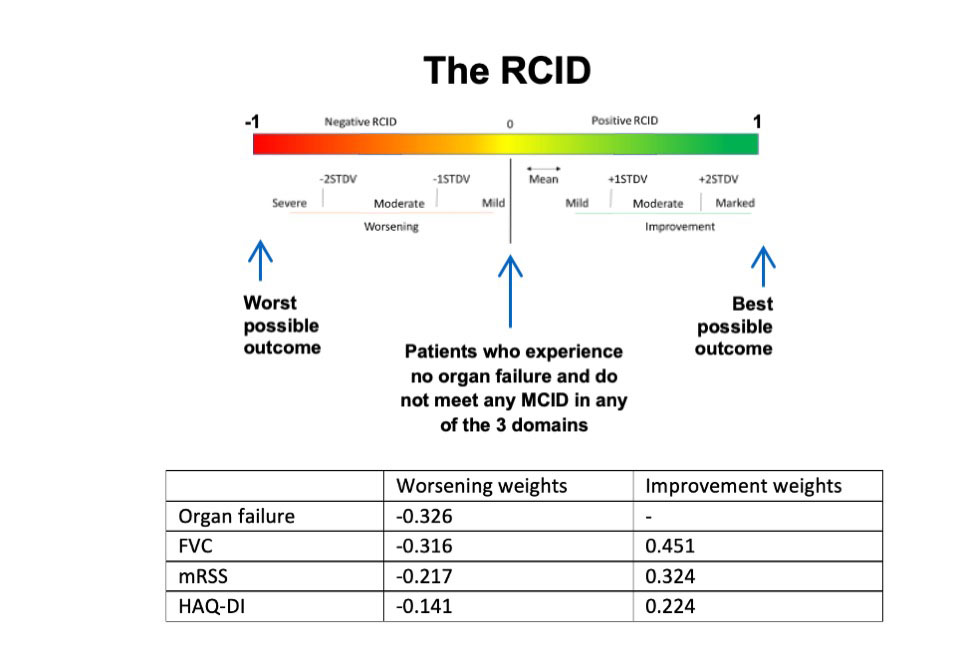Session Information
Date: Saturday, November 12, 2022
Title: Abstracts: Systemic Sclerosis and Related Disorders – Clinical I: Trials and Therapeutics
Session Type: Abstract Session
Session Time: 3:00PM-4:30PM
Background/Purpose: The ACR Composite Response Index in Systemic Sclerosis ( ACR-CRISS) is one of the first composite outcome measures in diffuse cutaneous Systemic sclerosis (dcSSc- Khanna D, et al. A&R 2016) . It relies on validated clinical domains selected through a data driven methodology, however only provides a probability of response and is unable to differentiate between patients who do not improve and patients who worsen.
Here we aimed to improve the clinical interpretation of the ACR-CRISS by creating a continuous ranked score of clinically and patient meaningful changes of its individual measures.
Methods: Following OmerACT guidelines for outcome measurement development, relevant stakeholders were identified from 5 continents, including 100 physicians with proven experience in managing patients with dcSSc and 100 patients with dcSSc who have participated to at least one clinical trial. An adaptive survey was designed utilising 1000Minds conjoint analysis software. Patients and doctors were asked to choose which of two hypothetical patients had a better or worse outcome according to Minimally Clinical Important Differences (MCID) in two domains among FVC, HAQ-DI and mRSS, and the presence of organ failure. Pairwise comparisons of patient and doctor choices were analysed utilising PAPRIKA methodology (Hansen P et al Multi-Criteria Decis. Anal 2008) to rank and weight the MCIDs against each other. Working jointly with patient and public involvement utilising a ‘think aloud’ approach, a video tutorial was produced explaining the objectives and process of the adaptive survey to the survey participants.
Results: 80 rheumatologists and 80 patients with Scleroderma accepted to complete the survey which ran from June 2020 to January 2021. Discrete choices conjoint analysis defined ranks and relative weights of the 4 domains in the improving and worsening outcomes. A continuous composite ranked score reflecting the relative weighting of the individual outcome measures (Ranked Composite Important Difference, RCID) was developed accordingly (Table 1). The score ranges from -1 (worst possible outcome) to 1 (best possible outcome), with patients that experience no organ failure and do not meet any MCID in any of the 3 domains scoring 0.
Conclusion: This collaborative process using novel robust methodology and involving both rheumatologists and patients has created a clinically and patient meaningful composite score that can be used as anchor to the ACR-CRISS, or other clinical outcomes. Performance against the ACR-CRISS, and revised CRISS in Randomised Controlled Trials will determine the clinical value of the RCID.
To cite this abstract in AMA style:
Bissell L, Furst D, johnson s, hansen P, Recalde E, Khanna D, Del Galdo F. The Development of the Ranked Composite Important Difference in Diffuse Cutaneous Systemic Sclerosis; A Clinical and Patient Meaningful Anchor to the ACR-Composite Response Index in SSc [abstract]. Arthritis Rheumatol. 2022; 74 (suppl 9). https://acrabstracts.org/abstract/the-development-of-the-ranked-composite-important-difference-in-diffuse-cutaneous-systemic-sclerosis-a-clinical-and-patient-meaningful-anchor-to-the-acr-composite-response-index-in-ssc/. Accessed .« Back to ACR Convergence 2022
ACR Meeting Abstracts - https://acrabstracts.org/abstract/the-development-of-the-ranked-composite-important-difference-in-diffuse-cutaneous-systemic-sclerosis-a-clinical-and-patient-meaningful-anchor-to-the-acr-composite-response-index-in-ssc/

